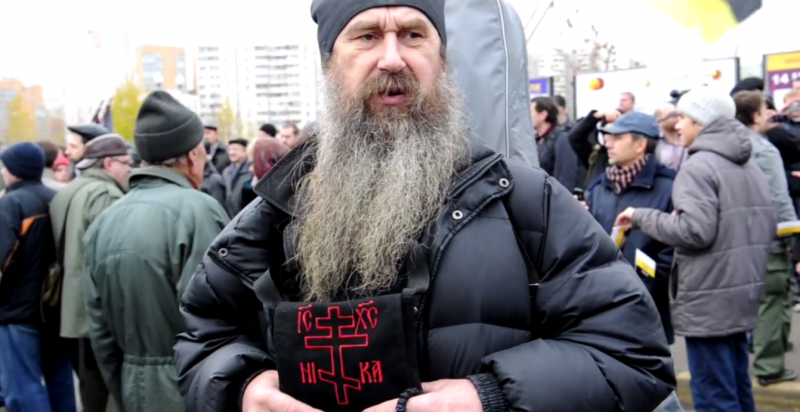Every year in Russia, ironically on the “Unity Day” holiday, the country’s nationalists stage a march in Moscow. Alexey Navalny—Russia’s most prominent blogger and oppositionist—attended every one of these rallies between 2007 and 2011. Last year was different. Navalny stayed home on Unity Day, claiming to have come down with a cold. It was the first “Russian March” since the anti-Kremlin protests of the 2011-2012 winter season, and many speculated that Navalny feared risking his new dissident credentials by parading alongside skinheads and masked hooligans (staples of the event). Earlier today, November 2, 2013, Navalny announced outright that he will not attend this year’s Russian March, scheduled for November 4.
Navalny revealed his decision in a LiveJournal post [2] [ru], describing his inability to participate in the nationalist rally as his “own political failure.” In the post, he laments that the march has not transformed, as he hoped, from a “gathering of marginal characters and sieg-heiling schoolchildren” into an “ordinary procession of conservative citizens.” Citing his experiences on the mayoral campaign trail this autumn, Navalny says Muscovites still fear nationalist street demonstrations, and explains that he now bears “a great burden of responsibility” to “observe the political balance” that won him second place in the election.
While insisting that his absence at the march reflects a new “balance,” Navalny also praised the event’s organizers (applauding three—Konstanin Krylov, Aleksandr Belov, and Vladimir Tor—by name), and promised to continue promoting nationalist activism in the future. Navalny even calls the nationalist Russian Social Movement [3] [ru] “an excellent example of a new kind of human rights organization.” Responding to a reader’s comment, Navalny also pledged [4] [ru] to “see through to the end” his online petition initiative to introduce a visa regime against immigration from Central Asia and the Caucasus. Indeed, he concludes his post with the clarion call:
Участие в РМ важно. Все, кто раздумывает идти или нет – приходите.
Participating in the Russian March is important. Everyone who is thinking about whether to attend—come!
Are statements like this what Navalny means when he talks about managing “burdens” and showing “balance”? More likely, Navalny has in mind the need to outmaneuver Kremlin operatives, who have used his past participation in the Russian March to argue that he is a racist and an extremist. Specifically, Navalny says he will not supply his enemies with footage of him standing next to “sieg-heiling schoolchildren.” He even singles out the need to thwart pro-Kremlin television journalists Evgeny Kiselev and Vladimir Solovev, who have compared him to fascists before.
Additionally, Navalny writes that he is not the only nationalist politician to suffer repression under the Putin regime, citing the authorities’ refusal to register political [5] parties [6] [ru] organized by nationalists like Krylov, Tor, and Valery Solovei. The Kremlin, Navalny says, refuses to recognize these factions, but finances “marginal stooge groups that use violence” and supports mass media that make nationalists into “boogeymen.”
Most heartfelt in Navalny’s blog post is his disappointment in many of his own followers. The text begins with a description of a man who confronted Navalny at a non-nationalist rally last month, carrying a sign that read, “Navalny, will you be going to the Russian March, too?” Though other demonstrators soon dragged the man away, convinced apparently that he was a hired provocateur, Navalny had his doubts, writing, “I don’t think he was a provocateur (in the sense that he’d been paid). He was just a fool.” Where anti-nationalists aren’t fools in Navalny’s post, he portrays them as cowards. “Liberal-democratic society,” he writes later on, “is unwilling to assume any responsibility for the civilized development of nationalism.”
Clearly, Navalny does not intend to renounce nationalism, but he is eager to finesse his views on Russia’s “ethnic question.” For instance, mere hours before publishing his Russian March LiveJournal post, Navalny shared the link to a YouTube video [7] [ru], where a young Chechen boy is depicted being encouraged to “kill Russians.” In his tweet [8] [ru], Navalny does not comment on the video, except to quote bits of the dialog. He carefully leaves it to his readers to draw their own conclusions about the boy’s curious upbringing.
In Internet parlance, Navalny’s decision to avoid future Russian Marches seems calculated “not to feed the trolls” like Kiselev and others, who would “unfairly” use images of Navalny beside skinheads to attack his reputation and undermine further the effort to bring nationalism into Russia’s political mainstream. In this respect, Navalny shows a growing appreciation for television media, where visuals, more than written arguments, carry the day.
